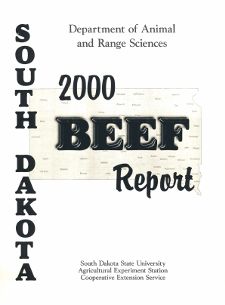Document Type
Report
Report Number
2000-15
Publication Date
2000
Keywords
colostrum, total protein, calf illness
Summary
Failure of calves to ingest and absorb immunoglobulin from colostrum is a risk factor for illness and decreased performance. Blood samples were taken from 752 calves at three SDSU research units. Total protein in blood, closely correlated to colostral immunoglobulin absorption, was determined and calf health records were collected. Using this data, a classification table of sensitivity and specificity was constructed to determine the relationship between total protein and calf illness and to classify calves as having adequate colostral absorption or inadequate colostral absorption (failure of passive transfer). Along with sensitivity and specificity, positive and negative likelihood ratios were calculated to identify a suitable cutoff point to separate calves that would become ill from those that would remain healthy. The cutoff point selected was a serum total protein level of 5.5 g/dL, which produced a sensitivity of 30% and specificity of 87%. Calves with total protein levels below 5.5 g1dL were 3.07 (95% CI 1.73-5.43, p=0.0002) times as likely to become ill as calves with total protein levels above 5.5 g/dL. In beef production situations similar to those in these herds, producers should be able to limit disease if calves' total protein at 24 hours following birth is equal to or greater than 5.5 g/dL.
Number of Pages
5
Format
application/pdf
Language
en
Publisher
South Dakota State University
Rights
Copyright © 2000 South Dakota State University
Recommended Citation
Courtney, A. K.; Epperson, W. B.; Wittig, T. A.; and Pruitt, R. J., "Defining Failure of Passive Transfer in South Dakota Beef Calves" (2000). South Dakota Beef Report, 2000. 16.
https://openprairie.sdstate.edu/sd_beefreport_2000/16

